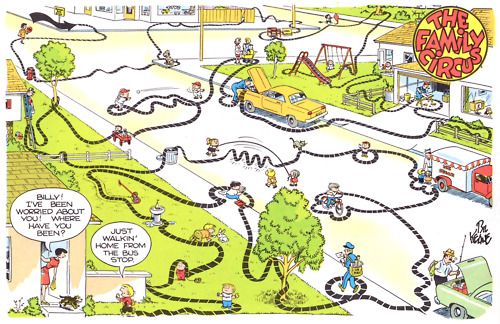A line everywhere misattributed to Chesterton reads thus:
The young man who rings the bell at the
brothel is unconsciously looking for God.
This line is not from the great [several senses of the word] man who recently celebrated his 150th birthday, but the mid-century most unmodern novelist Bruce Marshall. The words — which do sound a lot like GKC — are spoken by Fr Smith, in Marshall’s 1945 novel, The World, the Flesh, and Father Smith.
Accuracy and, more crucially, charity, say do not begrudge Mr Marshall, of whom I’d never heard, his line.
Haven’t read his novel either, but from the description here, the clerical creation of our Scotch author sounds a cross between Fr Brown [with fewer corpses … I think] and Diary of a Country Priest with a fair bit of humor.
The blogger at the link I don’t think has quite the read on Saint Flannery, but it’s not super-wrong. Charity has entry here, as well.
The words, a’course, suggest that even those pursuing the truly and ultimately not-good are participating in the Good. They themselves for starters bear the image of God — this is what makes their actions tragic. There is a pretty-well attested perspective as well, to take a second thought, that evil acts have no existence of their own; they are perversions of the Good.
[I doubt they even merit the capital ‘E’ … ]
This means they depend on the Good for even their [temporary, transitory] existence. Recall John Donne and his trash-talking on death — ‘Thou art slave to fate, chance, kings, and desperate men’ — and on and on with all the ways death ain’t all that and a kite, as he seems to think.
Spinoza has a brief discourse on devils, and their properly lowercase boss [going from ontology not grammar] possibly not even existing, or at least not in the form we imagine them.
[I shd not suggest I’ve read Spinoza; the quote is in a book, also mid-20th-century as it happens, called A Year of Grace, by Victor Gollanz. It’s an out of print and [my copy anyway] falling apart collection of quotes from and for life abnd such.]
Guys like Blake, Jung, and Dionysius the Areopagite are also quoted therein on this. The middle one, e.g., has a note — a reminder, pace Dr Johnson — that Saul was on his way to murder members of the new sect being, eventually, called Christians, and had the papers to prove it, when he set out on the Damascus road. Thereupon and upon which he had his vision and metanoia — changing our mind or, as Dr Willard put it, ‘thinking about one’s thinking.’
Rumi offers something directly related to where we began:
Our delight in pursuing the bad comes
from our belief that it is the good.
We can add Aslan here as well, the famous line where he tells a Calormene that in pursuing Tash — the god of his people — the man was actually after Aslan himself. And Flannery herself weighs in here, too, with her anti-heroic hero Hazel Motes, who thinks he’s founding the church of Christ without Christ but, well … rethinks this, and sees the Hound of Heaven was the pursuer, he the pursued — even the prey, in a sense, or perhaps the pray …
[There is a well-known painting, perhaps kitschy in some circles, of a rather more tame version of this idea … and it’s a young man ringing the bell, or knocking on the door anyway, at a brotheled life, so to speak, as well.]
It shd be noted that it takes a long time to rethink things, and also a lot of thinking, naturally. Or supernaturally.
Was reminded of the film The Fisher King here, which takes a resolutely roundabout route, one brimmed with life, both real and fantastic. There is myth and magic and mystery — always a sign we’re on a right and Good path — a knight that is more of a dragon, the unhoused and unhinged [not always the same people], apparent absurdity, danger, death, trauma, true love …
These are there, always. Flannery wrote, quoting a church father, I believe, of our ‘journey to the Father of Souls’ which means also, ‘all must pass by the dragon.’
When I was … ohh, less than five definitely, my Da was a radio deejay in upstate NY. This sounds grander than it was, given the rinky-dink size of the stations, regular format changes, and that the real paying part of the job was sales — advertising, to try to keep the little broadcast beacon beeping. I’d go to visit him with my mom and sister, which at one station involved climbing a set of wrought-iron stairs up the back outside wall of the building. It had the filigree-like metalwork of each step … and those massive [to my mind] maws between the steps. And was high.
The height, open air at every step, the Sisyphean tromp … but my father was at the top.
Like I said … life.
I thought it uneven at the end — there were gaps. So many films wd benefit from the limited series, streaming treatment, to give more time to tell the story.
[Of course, many also wd not.]
Still, it has 85% at Rotten Tomatoes, and far be it from me to argue J with the experts. Anyway, I’d give it at least that.
For a kid-friendly approach to the real and the fantastic [things are not what they seem] try The Mighty. Based on a book, Freak the Mighty, and with a 75% from RT, which is too low.
This is the quest, my friends.
And more, on both counts.
